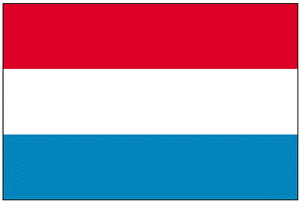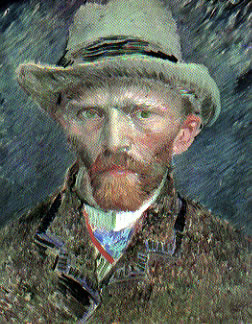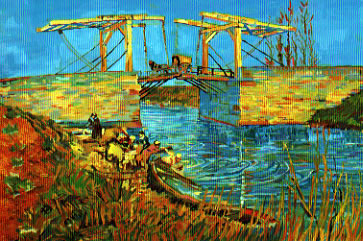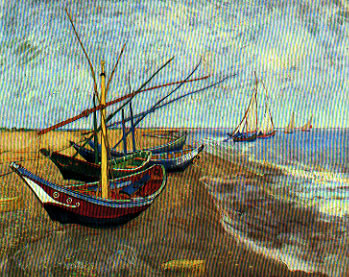
Amsterdam Travelogue
- IT atmosphere in EU : participated in G-Force
conference in Europe -
Cat: ECO
Pub: 2000
#: 0011a
Kanzo Kobayashi
12711u/18303r
Title
Amsterdam TravelogueRAVELOGUE
アムステルダム紀行
Subtitle
G-Force conference in Europe, May 2000
欧州G-Forceに参加
Author
Kanzo Kobayashi
小林寛三
Published
May 2000
2000年5月
Index
Why?
- I visited Amsterdam after 12 years absence in May 2000.
 Atmosphere in Europe seemed changed after the start of EU.
Atmosphere in Europe seemed changed after the start of EU.
The cold war was finished, and new Euro currency started, and
the confidence as rivalry to US monopoly of IT industry filled
the conference.
- I attended 4-day long partners-users conference at Amsterdam
hosted by Genesys Telecommunications Laboratories (called 'G-Force')
- Why in the Netherlands? What is Genesys? Why
so long conference?
What themes were discussed? What is the position of Japan among
US-EU IT industries?
- I try to respond to such questions in the following travelogue:
- (Note: CRM=Customer Relationship Management)
CRM is the latest concept
or system to realize Customer Satisfaction through the integrated services especially using CTI (Computer
Telephony Integration),
or Call Center, which is combined services of telephony and database.
-
2000年5月にアムステルダムを12年ぶりに訪問した。EU統合後、欧州の意識は変わったと思う。冷戦が終結し、ユーロの通貨統合が発足し、IT分野でも米国の一極支配に対抗できるのは欧州であるという自負に溢れていた。
-
今回の出張は、当社が代理店をしているCRM関連の新進のソフトウェア会社Genesys Telecommunications
Laboratoriesが企画した4日間のパートナー・ユーザ・カンファレンス (以下、G-Force) に参加したのである。
-
なぜオランダでなのか? Genesys社とは? なぜ4日間もなのか? どんなテーマで何が語られたのか? 米国・欧州のIT事情の中で日本は?等々の質問を想定して欧州の今のITの息吹を伝えたい。
- 注:CRM=Customer Relationship
Managementで顧客との関係を重視したコールセンタなど音声とデータを統合して活用するシステムのこと。
Summary
要約
>Top 0. Flavor
of Culture:

↑ Chess on the road in Amsterdam (↑アムステルダム市内の路上チェス)
0. 文化の香り

↑ National Gallery in Amsterdam (↑アムステルダム市内にある国立美術館)
>Top 1. The Netherlands now:
- This year is quadricentennial anniversary of association between
Netherlands and Japan.
- There are six traffic media in Amsterdam; tram, bus, taxi, water-bus,
bicycle and walking. In particular, the network of canal and exclusive
road for bicycle is quite unique. There are many bicycles left and
parked everywhere in the streets locked by abnormally strong chains.
Popularity of bicycle is natural as traffic medium in Netherlands,
because of free and rational way of thinking as well as almost flat
land.
- Present European Union (EU) composed of 15 countries started in
1992 by Maastricht Treaty from EC, which is politically united by
the Amsterdam Treaty in 1997. These are the cities in Netherlands,
aiming the center of EU with a casting vote between large countries
like Germany and France. Such situation reminds us history of the
East Indian Company in 17th century which governed most of the world
trade.
- EU 15 Countries:
- 1958-(6): Italy, France, Germany, Netherlands,
Belgium, Luxemburg
- 1973-(9): UK*, Ireland, Denmark*
- 1981-(10): Greece*
- 1986-(12): Spain, Portugal
- 1995-(15): Sweden*, Finland, Austria
- 1998-(11): EURO currency except * countries
- The Netherlands is a unique country. According to "Holland
Travelogue along the main road" by Ryotaro Shiba, sharp
critic famous for his historical travelogues, Netherlands established
civil revolution for the first time in the world. Her immigration
policy is quite open and flexible, accepting Jewish without prejudice,
which became a background of the tragedy of Anne Frank.
1. オランダという国:
- オランダは日本との交流400年記念の年である。市内の交通網は、市電、バス、タクシー、水上バス、自転車、徒歩と6種類もの手段がある。まさに交通のマルチメディアというべき状態である。特に、運河と自転車専用道路は普通は他の都市に見られない。自転車は町に溢れており、頑丈な鍵をつけてあちこちに放置している。オランダが低地でフラットということに加え、自由で合理的な考えにも関係していると思う。
- 現在のEU加盟15国を統合を決めた条約は、1992年のマーストリヒト条約 (ECからEUへ格上げ) そして、1997年にアムステルダム条約(Amsterdam
Treaty) として欧州連合条約が締結され、政治統合の一歩を踏み出した。いずれもオランダの都市であり、オランダは、今や独・仏大国間のキャスティングボードを握りEUの中心になろうとしている。17世紀初頭の東インド会社による世界貿易を席巻した歴史を彷彿とさせる。
- EU 15ヶ国:
- 1958-(6): 伊・仏・独・蘭・ベルギー・ルクセンブルグ
- 1973-(9): 英*・アイルランド・デンマーク*
- 1981-(10): ギリシャ*
- 1986-(12): 西・ポルトガル
- 1995-(15): スウェーデン*・フィンランド・オーストリア
- 1998-(11): Euro参加:*印を除く11ヶ国
- オランダというのは実にユニークな国である。司馬遼太郎"街道を行く:オランダ紀行"にもあるように、世界で初の市民革命を打ち立て、移民政策にしても欧州で一番開放的な政策をとっている。ユダヤ人に対しても偏見なく受け入れてきた。アンネ・フランクの悲劇の舞台となった所以でもある。





>Top 2. Genesys Telecommunication
Laboratories Inc.:
- Legacy telecommunication switch, ie, PBX (Private Branch eXchange)
such as Lucent, Nortel has its own proprietary protocol, composing
its unique world like a mainframe. But this unique systems were
converged by a middleware as the able interpreter. The creator's
name is Genesys, a venture company at San Francisco founded by Russian
expatriates in 1990 and succeeded in IPO in 1997, gaining top market
share in short period both in US and worldwide.
- Last year (1999) Alcatel, a French big company, purchased this
Genesys, counteracting US dominance in this emerging market. This
time was the first user and partner conference held in Europe after
the merge by Alcatel. The participants counted 400 people from worldwide,
but about two thirds are from Europe; such as telecom, financial
and hi-tech industries in Europe.
2. Genesys社という会社:
- 歴史のある電話交換機 (PBX) の世界は、今でもLucent, Nortelなど機種毎のプロトコールが異なり、メインフレームの世界のように、それぞれ独自の世界を作っていた。これをロシア移民のベンチャーである
Genesys Telecommunications Laboratories社 (1990年に設立、1997年にIPO)
が変えた。主なPBXに対応して、コンピュータの世界との連携ができるようなミドルウェアを開発し、短期間にトップシェアの会社にのし上がったのである。
- 昨年、仏AlcatelがこのGenesysを買収し、米国独占に待ったをかけた。今回のGenesys社によるパートナー・ユーザ・カンファレンスは、従来米国中心に展開していた会議を、初めて欧州の中心で開催したのである。参加者は米国でのカンファレンスに劣らず、欧州のテレコム、金融、ハイテク関連などから合計400名が参加し、このうち約2/3が欧州勢であった。
>Top 3. United States of Europe
- Russia has historical close connection with France. France as
a leader of the Union, will not admit America-centric order both
in Internet and eBusiness. Fortunately, Europe shows good leadership
in the next generation of mobile technology. Europe raises objection
to the dominance of the next technology of eBusiness using convergence
of voice and data.
- IP Switch is one of such areas, where CISCO, a US blue chip company
will be a strong competitor. Europe is composed of multi languages
spoken areas unlike mono-language countries like US.
- The atmosphere of rivalry with US hung in the air during the conference,
giving us interesting episode. The elite in Europe do not care about
English, French and German in addition to their native language.
When some part of the presentation material is written by non-English,
some audience warned it is unreadable, then the European speaker
commented, "Is it a problem?"
- A keynote speaker underscored that when we want to sell CRM software
in Benelux countries, we should recognize the culture difference
between Amsterdam and Brussels which are only about some two hundred
kilometers apart. Germanic approach, ie,> logos such as quality of product, comparison list with competitors, pros
and cons of the alternative system are prevailing in Amsterdam,
while Latin approach, ie, >pathos such as experience and creditability of the seller, human network
or intimacy with the clients are more important in Brussels. It
is interesting that such a cultural divine runs between two contrasted
cultures in such a narrow area ('Digital Divine' was another theme
at the conference.).
3. 欧州合衆国:
- ロシアは伝統的にフランスと関係が深い。フランスは、EUの盟主の一人として、米国による一極支配を潔しとしない。インターネットもeビジネスも米国中心の状況を正したい。幸い、次世代携帯電話の規格では欧州は主導権を握った。音声とデータを組み合わせた次世代型のeビジネスの基盤技術でも米国の独占は困る。
- 特に次世代のIP Switch分野では、CISCOを対抗意識をむき出しにしている。多言語を前提として欧州各国は、米国のように英語のみの環境とは異なる。等々、アンチテーゼとしての欧州を前面に出した欧州でのカンファレンスは、いろいろな意味でおもしろかった。
- 欧州のエリートは、自国語の他に英独仏を自由に操る。プレゼン資料でも一部がオランダ語など英語以外のままになっていたので、読めないと文句を言ったら、"そんなに問題ですか?"というような対応?
- CRMソフトウェアを売り込む場合、約200km しか離れていないAmsterdamとBrusselsとでは、売り方がまったく異なるという。なぜか?Amsterdamはゲルマン的アプローチ、即ち、製品の良さ、競合商品との比較、システム導入のメリット・デメリットなど>LOGOSが優先する世界に対し、Brusselsは、ラテン的なアプローチ、即ち、売り手の実績と信用度、顧客との人脈など>PATHOSが優先する世界である。ベネルックスという狭い地域にこの二つの文化の分水嶺
(デジタル分水嶺が会議のもう一つのテーマだったが) が存在しているのはおもしろい。
>Top 4. The New
Alchemy:
- Mr. Rhion H. Jones, a consultant from Europe, describes. IT technology
might be the present Alchemy, but its perception (services or customer
relationship) could be different among countries;
- In Europe, we need to adapt and apply the best of US
technology to the way European think and behave....
- Customer Service in Japan is a deeply personal transaction
- In the Middle-East, respectfulness & courtesy can
be as important as the solution to the problem.
- In Germany, customers find it difficult to distinguish
between Product and Service.
- In USA, Customer Service is often the differentiater.
4. 新たな錬金術:
- 欧州出身のコンサルタントMr. Rhion H. Jonesは説く。IT技術は、現代の錬金術とも言えるが、その普及に関しては、サービスや顧客重視のあり方などが各国で異なる
- 欧州では、米国の最良の技術を欧州人が考え行動する方法に適用する。
- 日本では、顧客サービスは個人の関わり合いと深く関連している。
- 中東では、尊敬や礼儀は、問題解決と同じく重要である。
- ドイツでは、顧客は製品とサービスとを区別することは難しいことを発見する。
- 米国では、顧客サービスとは、しばしば差別要因となる。
>Top 5. Five recommended
books of IT Revolution:
- IT Revolution brought a global single technology market. This
means that "The way technology works is the same everywhere."
But it is true that "The way we work with Technology can be
very different!!"
- To understand what's happening in the present IT revolution, the
following books are recommended:
- "Hightech Hightouch" by John Ncisbitt
- "Virtual Selling"
by Tom Siebel, 1996
- "Enterprise One-to-One" by Peppers & Rogers,
1997
- "Customers.com" by Pat Seybold, 1998
- "Permissions Marketing"
by Seth Godin, 1999
- All these books emphasize the new marketing style and customer
relationship in IT revolution age.
5. IT革命書5冊:
- IT技術革命によって、世界単一の技術市場が誕生した。そして世界のどこでも同じ技術が適用できるようになった。だが、その技術のどう使うかについては、国や地域によって非常に違う。
- 現在進行中のIT革命を理解するには以下5冊の本を読むのが良い。
- "ハイテク・ハイタッチ" by John Ncisbitt
- "バーチャルセリング" by Tom Siebel, 1996
- "ワンツーワン企業" by Peppers & Rogers, 1997
- "カスタマーズ.ドットモム" by Pat
Seybold, 1998
- "パーミッション・マーケティング"
by Seth Godin, 1999
- いずれも顧客との関係を強調したIT革命時代のマーケティングのあり方を述べたものである。
> Top 6. Overwhelming
information flow:
- In the international conferences, we usually feel the overwhelming
volume of information (compared to the domestic ones). It is interesting
to see the presentation materials how uniquely prepared reflecting
the presenters' idea and sense, or even biased opinion. Furthermore,
the speakers demonstrates their talent in the actual presentation,
deviating from or adding to the written materials, sometimes with
jokes and gestures.
- Such talented presenters are not made instantly, but spent long
education period where they have tried to make good presentation,
learned how to communicate with the audience and brushed up their
abilities in various occasions.
- Receiving sudden severe questionnaire, they never show sign of
upset. First, they comment, "Good question!", then "In
my understanding the question means so and so.... and I'd explain
a bit of the background......, and the answer is not so simple.........,
anyway, it is core of the subject...... " Then without giving
proper answer, he continues, "Next question?" It is really
an interesting show!
- The native speaker can find the most impacting expression in various
occasions, selecting proper key words or even creating new terms,
bringing to a conclusion considering flow of logic; in Chinese expression,
'Introduction', 'Development', 'Turn', and 'Conclusion'. We envy
English is a really flexible language in absorbing new concept and
forming new words. In Japanese can we have similar free formation
of new words?
- In IT industry, we frequently encounter new jargon or acronym.
Glossary or dictionary of IT related terminology is updated every
year. In a conference, there was such a scene; "Do you know
what is TMA?" The meeting room became quiet. The speaker continued
slowly, "TMA is a totally new concept representing Too Many
Acronym!"
- In the G-Force conference, there are concurrently five special
sessions (Technology, Business solutions, Industry solutions, Business
Insight and Interaction) in addition to the everyday key note speeches.
As there are three to five special sessions, totaling 55 in 3-day
conference. The speakers are composed of famous IT consultants,
business leaders, technical specialists having actural experiences,
and are specialists of particular themes. The sessions have the
atmosphere like a classroom of business school; arousing audience
to raise active Q&A, opinions and objections.
- Though most of the contents were distributed in advance this time
which was very helpful, but we need to concentrate and keep interest
on the theme, following flow of the explanation.
- A tense atmosphere in such a conference with overwhelming flow
of information in English, and a challenge to participate in questions,
comments, or objections to keep interactive communication would
be worthwhile and fruitful. Such a experience could be an everyday
affair for a netizen (networked-citizen) in the Internet age.
6. 圧倒的な情報発信量:
- 国際会議でいつも感じることがある。それは (日本での同様の会議に比べて) 圧倒的な情報発信量があることである。プレゼンテーションは、それぞれ個性を発揮して
(独断と偏見とも言えるものも含め) 作成されており、また実際のプレゼンテーションにおいては、その内容のとらわれず、ジョークとジェスチャーを交え、一つのショーともいうべきタレント性を発揮する。
- おそらく社会人となる遙か以前の教育課程をも含めて、人前でプレゼンテーションし、意思を伝達するかについて、相当な場数を踏み、才能を発揮してきたかがわかる。少々厳しい質問が出ても、まず彼らは動じない。取りあえず、"Good
question!"と言ってから、その質問の意図は私としてはこう解釈するが...その背景は...その回答はそう単純ではないが...意味な意味を含んでいるが..
(早く言わんかい!) そして何ら悪びれずに、"Next question?"。実におもしろいショーである。
- さらに、"言葉"の使い方がうまい。その時点での最もインパクトのある表現、キーワードを抽出して、起承転結を考えてまとめている。新たな略語、新たな造語に遭遇することも多い。英語はかなり自由に発展できる言葉であることがうらやましい位である。我々が使用する漢字にはそのような自由な造語法ができるのであろうか?
- このIT業界には、多くの略語 (Acronym、頭字語) がものすごい勢いで登場している。その用語を集大成して追補するだけでも、毎年情報通信分野の辞書が改訂されているような状況である。こんな場面があった。"例えばTMAという略語はご存知ですか?" 会場が静まりかえる。そしておもむろである。"TMAとは新しい概念で、Too
Many Acronymといいます。(^_^;"
- 今回のカンファレンスは、毎日の全体会議 (キーノート・スピーチ) に加えて、5つのテーマに分かれて (技術、ビジネスソリューション、業界ソリューション、ビジネス洞察、対話)
が一日3~5時限もあり、3日間合計では55セッションが準備された。それぞれ著名なITコンサルタントであったり、実際に導入経験にもとづくリーダであったり、個別のテーマでの専門家によるビジネススクールのような活発な質疑・意見・反論を歓迎するような雰囲気で進められた。
- 幸い、プレゼン資料は予め印刷配布されていたので助かったが、相当にテンションを高めて参加しなければとても流れに乗って聞くことはできない。
- このように会議などにおける英語による圧倒的な情報量の中で、何とか動じないで質問、意見、異論を唱えるによって双方向通信の確保することは、国際ビジネスマンにとって非常に意義がある。インターネット時代のネチズン
(ネットワーク市民) とっては、このような経験は日常的なものとなるだろう。
> Top 7. Local version
of software:
- There was a special session with the theme of 'Internationalization
of software'. In order to succeed in the global market, quick distribution
of the local version is indispensable. English and European languages
can be expressed by one byte (max 256 characters), but actually
English is expressed by 7 bits, while European languages are a bit
different requiring 8 bits to include accent aigu or umlaut, etc.
Furthermore, cultural differences are not small; 1) expression of
date, 2) usage of punctuation, 3) alphabet, 4) currency, 5) sorting.
- In case of Japanese, Chinese and Korean, the situation becomes
more serious, requiring two byte (max 65,536) to express enormous
Kanji character (about 3,000 ideograph) including additional phonograph
expressions. Two byte may cause additional troubles, needing clear
definition to distinguish one byte and two bytes message in the
program.
- There are two steps in making local version:
- 1) "Internationalization" (abbreviated 'I18n')
First, the basic structure should be prepared to convert into
various local versions. At the coding of the original program
(usually English) we should consider future assumption of making
two-byte based local version.
- 2) "Localization" (abbreviated 'L10n')
Conversion from the originalversion (English) into various local
language version (including translation of user interface or
dialog box, etc. as needed.) Also, we must verify them by quality
assurance (QA) test of full functions of the converted software.
- This particular session was particularly popular among the visitors
from Europe and Asia, and looked relatively less popular among US
visitors. For Europeans, it is usual to consider multi languages
environment within European community, and perception of globalism
is different; real globalism cannot be attained excluding Europe.
- But Asia insists the inclusion of Asian market of two byte coding
is essential. The definition of globalization will approach to the
situation of United Nations in the context of orthodoxy but the
actual limit of power. How to deploy the globalized products in
what speed and quality and by whose account will be a serious problems
in the global Information age. I would mention this could be another
"Global Digital Divine" phenomenon.
- In Japanese Business-to-Consumer (B2C) market, Japanization is
essential, but in Business-to-Business (B2B) market is not so much;
if we can use the original English version as it is in case of some
application software, taking advantage of quick deployment of original
version.
- Forrester Research forecasts about each market size;
- B2B will be $2,700 billion in 2004
- B2C will be $108 billion in 2004; the ratio is 25 versus 1.
- In Sogo-shosha (general trading company), when telex had
been major communication medium, English was prevailing, or if we
write Japanese, we are enforced to type in alphabet ('Roman Letters').
After two byte Kanji characters processor became common, such enforcement
using one byte culture was neglected. English is still recommended
by other reason like easier communication with local staff of the
overseas offices.
- The advantage by one byte English is getting more obvious in such
fields as business transaction, joint venture, research and development,
and management information based on global accounting system. It
is well-known that English is more effective than Japanese in retrieving
database.
- Communication by English may change the way of thinking and expressing,
or even structure of the organization. English speaking Asian countries
like India, Singapore, and Hong Kong have the advantage in using
the original and frequently updated English version software.
7. ソフトウェアの各国語版:
- 一つの分科会でソフトの各国語版開発をテーマにしたセッションがあった。ソフトウェアを世界で販売するためには、早い段階で各国語版を作成投入する必要がある。英語版も欧州各国語版も1バイトで表現
(最大256文字) できるが、英語の7ビット表現に比べて欧州では8ビット表現というように、同じ1バイトであっても各国の表現は微妙に異なる。また各国語の表現方法、特に、1)
日付の表現、2) 句読点 (.,) の使い方、3) アルファベット表記、4) 通貨表記、5) ソート順など相違点は少なくない。
- 日本語・中国語・韓国語の場合は、それらに加えて膨大な表意文字である漢字表現と表音文字を必要とする2バイトが必要 (最大65,536文字)
となり、更に遠方に位置することになる。2バイト表記はプログラムにおいて1バイトとの区別を含め、課題は大きくなる。
- このためには、以下の2段階の対応が必要である。
- 1) まず、国際語化 ("Internationalization"
、 I18nと略称)
各国語版を効率よく作成できるような基本構造を備えること。2バイト表現に変更されることを予め想定してプログラムの構造そのものを最初から作成する。
- 2) 次ぎには、ローカル語化 ("Localization"
、L10nと略称) :
具体的に、特定の市場向けにローカル版を作成すること。 (User interface/Dialog boxの翻訳、必要に応じてカスタマイズ、可動確認の検証を含む)
- この分科会には、当然ながら欧州・アジアからの参加者が多く、米国勢には相対的にあまり熱心でないように思えた。域内に複数の文化圏を抱え、さまざまレベルでの翻訳文化を余儀なくされている欧州とのグローバルの認識の違いとも言える。米国にとっては、グローバル化=アメリカ化の色彩が強いのに対し、欧州は、欧州抜きの真のグローバル化はあり得ないという立場である。
- アジアとしては、2バイトのアジア市場を無視しては、本当のグローバル化とは言えないとう主張となる。そうなると、グローバル化=国連化
(筋としての正統性と力の限界という意味での) という連想になってくる。グローバル化をどのようなスピードと完成度で実戦配備するのか、その費用は誰が負担するのかという議論は、これからのグローバルな情報化にとって深刻な課題となろう。これはもう一つの"グローバル・デジタル・デバイド"現象である。
- 日本においては、一般ユーザを対象とするB2Cにおいては、日本語化は必須だが、企業間のB2Bにおいてはそれほどでもない。一部のアプリケーションによっては英語版そのものを利用することで早期活用のメリットとなる。
- なお、Forrester Researchの市場予測によれば
- Business-to-Business (B2B):2004年には$2,700B
- Business-to-Consumer (B2C)は$108B、と見込まれ、この比率25対1
- 因みに、総合商社においては、Telexが主要な通信手段であった時代には、英語によるコミュニケーションが主流で、一部やむなくローマ字を使用していた。その後、2バイトが可能なワープロの時代になって、英語による通信は強制されなくなった。英語は、海外スタッフ活用の情報交流など観点から推奨されている。
- 1バイトの英語をそのまま使用することの効用は、特に、ビジネス取引、合弁事業、R&D分野、あるいは今後は国際会計基準に基づく経営管理どの分野で、大きなメリットであることは明らかである。特に、データベースの検索をする場合、英語は日本語の検索に比べ、非常効率が良い。
- 更に、英語によるコミュニケーションで、発想意識も表現方法も組織構造も変わり得る。インド、シンガポール、香港など英語圏のアジア諸国は、頻繁にバージョンアップされる英語版ソフトウェアの活用という観点からも非常に有利である。
> Top 8. Vitality
and Information Infrastructure:
- After the end of the conference, another business migration starts
to the next business scene. In the business conference, front seats
are quickly occupied first. (I also tried to get the front seat
mainly to avoid sleeping!) At the brake of lunch or coffee time
of the session, another association, or company in the original
meaning, starts. Let's participate in the conversation to seize
any chance, which looks same in creating human network both in the
East and the West.
- At the evening party, or entertainment program, we need not to
lose our vitality of;
- studying;
- speaking,
- making question,
- eating and drinking,
- keeping good company,
- and enjoying.
- These six kinds of vitality may correspond to infrastructure of
the global communication. After the conference, global business
persons hurried to return their offices, or the next meeting, cheerfully
like migratory birds.
- P.S.:
Japanese users are frustrated in narrower and expensive information
infrastructure compared to the US, but if it is solved, are we ready
to create affluent information passing in the expanded infrastructure,
keeping vitality to sustain such creativeness and ideas?
8. バイタリティと情報インフラ:
- 活発な議論のセッションが終わると、次ぎのビジネス機会に向けて移動が始まる。日本と異なり座席は、前から一杯になる。 (小生も眠気を避ける意味でも、なるべく前の方に座ることにした。)
その間、ブレークになると昼食やコーヒータイムとなり、それぞれ思い思いに交流が始まる。少しでもチャンスがあれば話題に入り込めるように参加しよう。洋の東西を問わず、人脈作りの風景は同じである。
- 夜には、またパーティとなり、その間、エンターテインメントの出し物もある。実に
- よく学び、
- よく喋り、
- よく質問し、
- よく飲食し、
- よく交流し、
- そしてよく楽しむ。
- この6つのバイタリティこそが情報交流インフラに相当するのかも知れない。 カンファレンスが終わるや否や、グローバルなビジネスマンは、それぞれの国の職場に、あるいはまた次ぎの会議へと渡り鳥のような気軽さで出発して行った
- 追記:
米国に比べ、日本の情報インフラが細くて高いとの不満があるが、では情報インフラが太くなり安くなったときに、その中を流れる十分なコンテンツを創り出せるのか、あるいはその基になるバイタリティやアイディアを維持できるだろうか?
Comment
- G-Force in Amsterdam held in 2000 gave me impressive millenium
event; recongnizing new emerging European Union, and way of thinking
as another global leader.
- 2000年にアムステルダムで開かれたG-Forceは印象的なミレニウムのイベントをくれた。それは新たなEUの勃興と、もう1つの世界のリーダの考え方を認識させるものだった。
 |
Amsterdam Travelogue- IT atmosphere in EU : participated in G-Force
conference in Europe -
|
Cat: ECOPub: 2000
|
Kanzo Kobayashi |
12711u/18303r |
Title |
Amsterdam TravelogueRAVELOGUE |
アムステルダム紀行 |
Subtitle |
G-Force conference in Europe, May 2000 | 欧州G-Forceに参加 |
Author |
Kanzo Kobayashi | 小林寛三 |
Published |
May 2000 |
2000年5月 |
Index |
||
Why? |
|
|
Summary |
要約 |
|||||
>Top 0. Flavor of Culture:
|
0. 文化の香り
|
|||||
>Top 1. The Netherlands now:
|
1. オランダという国:
|
|||||
|
||||||
>Top 2. Genesys Telecommunication Laboratories Inc.:
|
2. Genesys社という会社:
|
|||||
>Top 3. United States of Europe
|
3. 欧州合衆国:
|
|||||
>Top 4. The New Alchemy:
|
4. 新たな錬金術:
|
|||||
>Top 5. Five recommended books of IT Revolution:
|
5. IT革命書5冊:
|
|||||
> Top 6. Overwhelming information flow:
|
6. 圧倒的な情報発信量:
|
|||||
> Top 7. Local version of software:
|
7. ソフトウェアの各国語版:
|
|||||
> Top 8. Vitality and Information Infrastructure:
|
8. バイタリティと情報インフラ:
|
|||||
Comment |
|
|